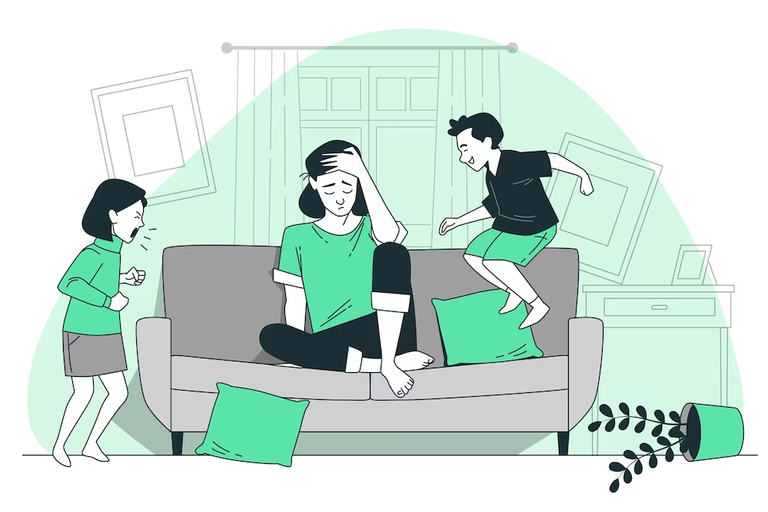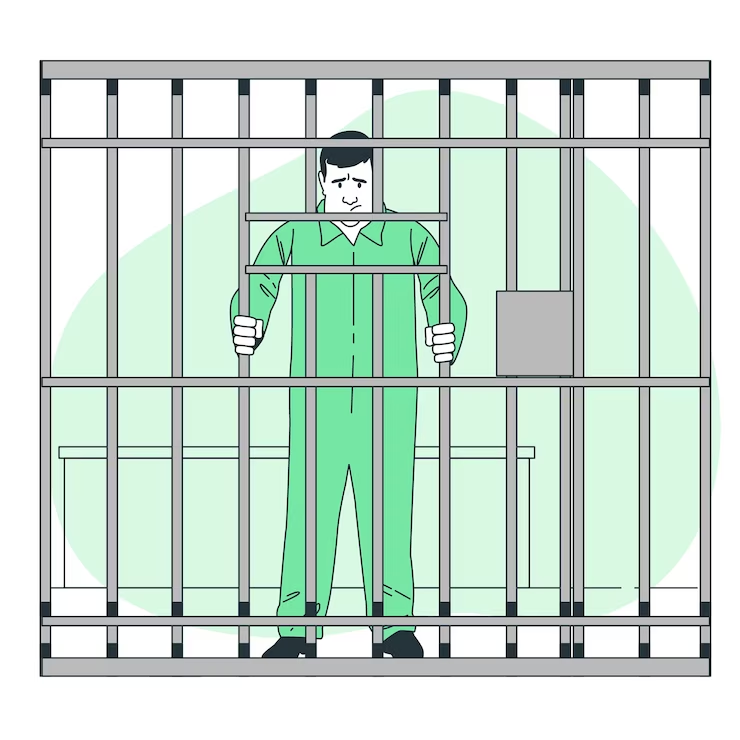For The Little Ones Who Kick, Punch, Bite and Steal- A Literature Review

Image by storyset on Freepik
In one of my most recent posts about discipline among African parents, I described what it was like growing up with my mom as the disciplinarian and how much of her harsh parenting came from a place of love and care. As a child, of course, I didn't understand this, but growing up now and understanding how my mother's decision to be a little strict with my major offenses has shaped the way I make decisions has cleared my eyes of the doubts I used to have. It brought my mother and me closer and made me want to know more about this topic.
In my last post, I referenced Proverbs 13:24 as the origin of much of the understanding the world has about discipline and love. I tried to advocate for it.
After writing that post, I went through the day thinking I might be wrong. You see, there is a relationship between harsh parenting and conduct disorders, as I listed in my post.
If that were the case in a country like Nigeria, there would be a high incidence of proof that we indeed suffer from conduct disorders. In my mind, I could find this proof in the way crime in Nigeria is probably one of the highest imaginable.
Of course, I came up with this hypothesis without any data to back me up, but it seemed true at the time.
If this were the case, then every society where there is a higher crime would be associated with stricter discipline and more cases of conduct disorder. But as with many cases in behavioral sciences, it is very difficult to say just how much people are being influenced by childhood experiences.
My analysis of behavior and conduct disorders also took me to the endpoint for all mental health disturbances, which is suicide. I tried to compare suicidal behavior among countries to see if there was a relationship between male suicide, in particular, and disciplinary behavior in children.
If my hypothesis were right, we would find that conduct disorders (which are related to parenting style) were more prominent in Western countries, where other factors such as neglect are more significant in influencing conduct disorders.
The problem with this analysis of the available data is the fact that Western countries may also be more likely to have carried out more extensive research on this, hence more available data.
My hope in all this is to protect male children, especially those who kick, punch, bite, and steal, because society appears (in my view) to be uninterested in doing so.
In a recent TikTok squabble I got into, I made comments on a post where a prominent psychiatrist was making remarks on the fact that women are simply more intelligent than men in the things that matter, and this is why men tend to get into prison more. So take this as my statement of purpose (maybe in life).
I don’t think this is a wise stance to have concerning two creatures that were thought to be created equal in the eyes of man and God. If you check that post, you might see my comment about how men are more interested in other things, and even though women may have more frontal lobe activity, it does not make it right to condemn men to a life of crime simply because they are men.
For The Little Ones Who Kick, Punch, Bite and Steal

People illustrations by Storyset
Conduct disorder is a serious mental health condition that can have a significant impact on a child's development and their relationships with others. Children and adolescents who have conduct disorder often engage in behavior that is aggressive, destructive, and violates social norms and rules. They may have difficulty controlling their impulses, regulating their emotions, and exhibiting empathy towards others.
The symptoms of conduct disorder can vary in severity and may include physical aggression, verbal aggression, bullying, lying, stealing, vandalism, truancy, and substance abuse. These behaviors often result in problems at home, school, and in the community, leading to strained relationships with parents, teachers, peers, and law enforcement.
The signs and symptoms of conduct disorder can start to appear as early as age 6 or 7, although they are often first noticed during the preteen years. Early warning signs may include temper tantrums, aggressive behavior towards other children or animals, defiance towards authority figures, and difficulty following rules or instructions.
Conduct disorder is typically not diagnosed before the age of 4, as young children are still developing their social and emotional skills, and occasional aggressive or rule-breaking behavior is a normal part of development. However, there are some early warning signs that parents and caregivers can look out for.
For example, children who consistently engage in physically aggressive behaviors such as hitting, biting, or kicking others, even at a young age, may be at risk for developing conduct disorder. Other concerning behaviors include persistent disobedience, frequent temper tantrums, and an overall lack of empathy for others.
If left untreated, conduct disorder can lead to more severe mental health problems in adulthood, such as substance abuse, depression, and criminal behavior. However, with early intervention and appropriate treatment, many children and adolescents with conduct disorder can learn to manage their behavior, develop healthy coping skills, and improve their relationships with others.
Many of those who have conduct disorders have been found to progress to having antisocial behaviour. In some studies they have found that over 80% of those in prison have an antisocial personality disorder.
Parenting Styles

If you want to see my case study on how my mother dealt with more intense issues like coming late to the house as a child, you can check my formal post.
In this post, I want to describe the available information we have on parenting in African societies, if any, and relate it to the outcome we have for conduct disorders.
According to this study, there was a relationship between overprotective fathered parenting and low care of mothers and conduct disorders.
The literature review of this study on:
wrote that education and financial status played a major role in the outcome of children from Nigerian homes.
When the culture shifts to African American homes, one study saw that in 156 children between the ages of 6 to 9 years living in single mother homes, a study that tested a family process model that linked maternal education, maternal religiosity, and family financial resources to cognitive and psychosocial competence of the mother found that those who were educated, religious, and had money while being strict with parenting led to better outcomes with children.
Parenting styles and disciplinary practices can vary greatly across cultures and regions of the world.
In Western countries such as the US and the UK, parents are more individualistic, and there is more emphasis on encouraging independence and self-expression in children while Asians tend to be more collectivist, with an emphasis on obedience, conformity, and respect for authority.
I think when Africans are thrown into the mix, they make Asians appear more individualistic in their pattern of parenting, but I could be wrong. There are also theories that English-speaking countries tend to emulate the United States in terms of behavior.
Western parenting techniques usually include time-outs, taking away privileges, and positive reinforcement to shape their children's behavior, and they tend to communicate more openly with their children.
Asian homes are more traditional and make use of physical punishment like spanking and slapping or use of shame and guilt to correct children's behavior. In their homes, they pay more attention to maintaining harmony and preserving social order.
The Outcome

In terms of results regarding conduct disorder, from the available data, Western countries tend to have a higher incidence of conduct disorders compared to other countries.
In my view, it seems as though we need to learn from each other. I don't think any society has it all figured out. There is a need for strict parenting, but there is a greater need for responsibility among parents.
As I said in my formal post, there is a stronger relationship between conduct disorders and parental neglect and poor financial status. There is also a stronger relationship between single motherhood and conduct disorders.
The fact that this data exists, and the world pays no mind to it, leads me to believe that it is something that is better off being hidden for some people who control the narrative.
How did we get to the point where standard truths that have merit to the mother, the father, and the child are hidden, yet narratives that could ruin the child are toyed with to see if they work?
From African parenting, we see that child abuse is almost encouraged while still allowing for individualism that is seen in American societies. It is like we took the worst from the Asian and the Americans and are going with it.
While it is true that different societies have different approaches to parenting and there is much to learn from each other, it is important to recognize that child abuse and neglect are never acceptable. Strict parenting should not come at the cost of a child's well-being or safety.
Additionally, it is crucial to address the underlying social and economic factors that contribute to conduct disorders, such as poverty and lack of access to resources.
It is concerning that some data and truths about parenting are being ignored or hidden, while harmful narratives are being perpetuated. We must prioritize the well-being of children and families and work towards creating a society that supports healthy development and positive parenting practices.
You can send me a message on WhatsApp at +2348134530293, and we can have a conversation, or you can speak with a licensed therapist.
Conclusion
In conclusion, conduct disorder is a serious mental health condition that can have a significant impact on a child's development and their relationships with others. It often results in problems at home, school, and in the community, leading to strained relationships with parents, teachers, peers, and law enforcement. Early intervention and appropriate treatment can help children and adolescents with conduct disorder manage their behavior, develop healthy coping skills, and improve their relationships with others.
While some studies suggest a relationship between strict parenting and conduct disorders, it is important to note that this is not always the case. It is difficult to say just how much childhood experiences influence behavior, and many other factors, such as neglect, can also play a role. It is also crucial to acknowledge that there is a relationship between overprotective fathered parenting and low care of mothers and conduct disorders.
As a society, we should prioritize protecting male children, especially those who engage in aggressive behavior, from the consequences of conduct disorder. We should also strive to promote equal opportunities for both men and women, recognizing that intelligence itself is not determined by gender. Finally, we should work towards creating a more caring and empathetic society that prioritizes mental health and well-being for all.
Do you agree with the author's view that strict parenting is necessary for male children to prevent them from engaging in criminal behavior? How can parents strike a balance between being too strict and not disciplining their children enough?
Is conduct disorder more prevalent in Western countries as compared to African countries, and if so, what are the reasons behind this? How important is early intervention and treatment in managing conduct disorder, and what kind of treatment options are available?
What is the relationship between parenting style and the development of conduct disorder in children?

😥
I see how that can come off as dark. But discipline is discipline, and if it is done right the child grows to know it was from a place of love.
In African homes, we are suffering from real acts of abuse in families that also neglect the child and simultaneously are alcoholics...I don't want to tell you of the extreme cases I have seen in the hospital.
In North America, children are being bullied and reporting suicidal behaviour (both the bullies and the frequently bullied)...I think neglect is the harm that we should focus more on.
Check out my most recent post. You can read the conclusion to get your appetite wet on the topic.
https://ecency.com/hive-196387/@ebingo/the-calhoun-experiment-how-overcrowding-led-to-social-breakdown-and-abnormal-behavior-in-mice
Thanks for your contribution to the STEMsocial community. Feel free to join us on discord to get to know the rest of us!
Please consider delegating to the @stemsocial account (85% of the curation rewards are returned).
You may also include @stemsocial as a beneficiary of the rewards of this post to get a stronger support.
Congratulations @ebingo! You have completed the following achievement on the Hive blockchain And have been rewarded with New badge(s)
Your next target is to reach 120000 upvotes.
You can view your badges on your board and compare yourself to others in the Ranking
If you no longer want to receive notifications, reply to this comment with the word
STOPCheck out our last posts:
Support the HiveBuzz project. Vote for our proposal!
Never fails my friend, your work is thorough and detailed, engaging and well-illustrated. Class act, @ebingo, I appreciate your content - and as a father of two young girls, I always appreciate additional perspective to help me navigate my path in that role.
Stay well, brother, until next time!
I am very grateful that my content is having this effect on you ♥️♥️♥️
Sorry for the late reply... sometimes I miss some comments while clicking through. But I'm forming a new habit of going through them over and over again
Lol! I appreciate that! I do the same thing, it’s easy to miss one but so like to take the time to show my appreciation to everyone who checks out my stuff. Nicely done sir, you are a man of class!
❤️❤️🙇♀️🙇♀️
Thank you for showing up as often as you do man, it keeps the blog going.
You’re quite welcome. I remember that post of yours, a while back, essentially about making a joke and being misunderstood. I remember thinking, I like the way this guy does things, I have a good feeling here. And you’ve lived up to my expectations, I enjoy your work, your perspective, and the value you provide to the Hive community. As long as I’m around, I imagine I’ll keep showing up for that. Stay well, my friend!
Check out my most recent post. You can read the conclusion to get your appetite wet on the topic.
https://ecency.com/hive-196387/@ebingo/the-calhoun-experiment-how-overcrowding-led-to-social-breakdown-and-abnormal-behavior-in-mice
I was just talking about this with someone last week! I saw an experiment where the mice were given a mouse-sized Utopian city, and each time they eventually grew to critical mass and died off. I was comparing them to us…the person I was talking to did not like being compared to the rats lol!
Lol, many people have had similar sentiments...our behavior may be more complex than that of rats in a lot of ways but at the same time so similar. We are still seeing the similarities between what happened in this experiment and what happens in human societies...
I hope to write more about similar experiments so that we can see ourselves from a more simple lense